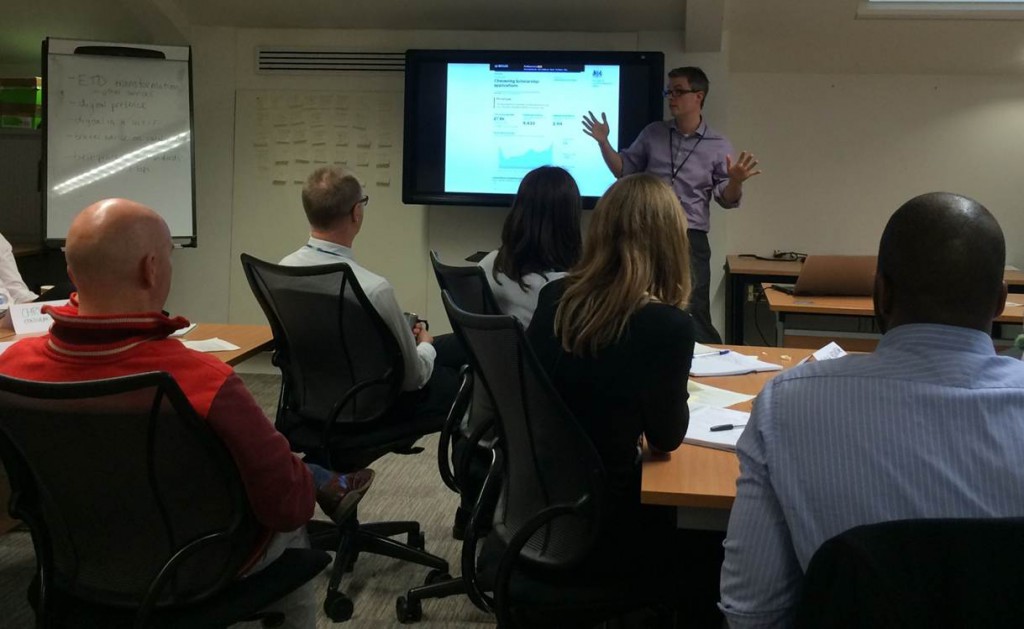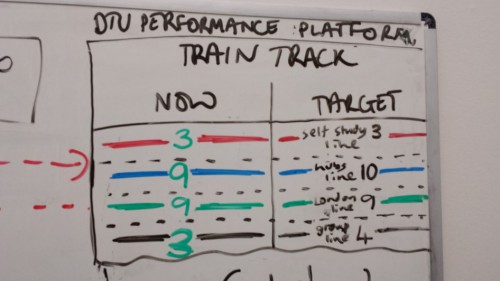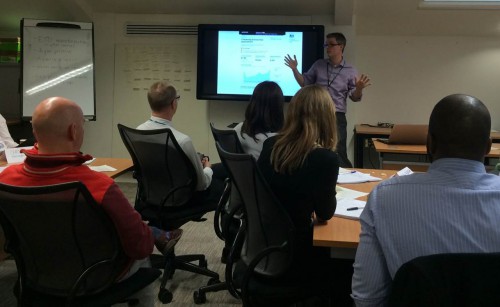12th January 2015 London, UK
The digital curriculum: from vision to reality

In November, my colleague Kate Burnham blogged about our work to design a new digital training curriculum for the FCO.
Since then, we’ve been busy running pilots – “beta” testing 11 modules, in 4 different formats, with over 140 people in over 25 countries (and demand was so high that we already have waiting lists for when we launch the training). At the end of the process, we went in detail through every feedback form, survey response and suggestion we’d received, to try and identify overall themes and understand what we could improve.
Monitoring our pilots with the aid of the “train track” (no severe delays…)
What did we learn?
On the contents of the training curriculum, our broad approach seemed right. Our staff work in a huge range of jobs – from developing policy on multilateral issues in London, to delivering frontline consular services in Thailand, or doing communications work in the Middle East. And their skill and knowledge levels vary too. So offering a range of “bitesize” modules, which can be slotted together to meet an individual’s particular needs, makes sense – but we need to make sure we advertise and label the modules clearly, so staff find the topics which are most useful for them. This approach also helped us to target our time and effort: we didn’t need to reinvent the wheel where training already exists (for example, from the Government Digital Service on using gov.uk), but could see that there was a gap in supporting staff who develop and manage specialised FCO digital services.
Another important part of this testing process was to explore the best formats and methods for building digital skills. The FCO employs staff across the globe, sometimes in very small posts of just 1 or 2 people. It would therefore be hugely inefficient (and expensive) to expect staff to attend lots of classroom training. And even though, as digital experts, we’d like to harness new technologies to run remote training for colleagues around the globe, we have to work around the daily connectivity challenges faced by staff in some parts of the world.
To find the best compromise, we trialled four delivery formats: classroom training (led by experts from our London team and global digital hubs); remote training (using phone and video conferencing); group learning (where non-expert staff volunteered to lead a group of colleagues through a session, using materials and support from us); and self-study (allowing staff to work through materials on their own).
In the vast and sometimes confusing online world, we found that staff really appreciate spending time with an expert, and reacted very positively to classroom training. So we have a challenge of training enough people round our network to deliver the digital curriculum, and continuing to explore ways to make remote training effective. Alongside this, group learning methods were popular, but can be tough for the people who lead the sessions – so we’re refining a “facilitator’s toolkit” and support package to help them. And finally, self-study is the reliable but sometimes unexciting fallback of training: convenient for building or refreshing basic knowledge, and an efficient way to cover pre-reading before a classroom course, but inconsistent in what staff get out (some read in detail; others skim) and hard to evaluate or follow up.
Phil “jazz hands” Buckley runs training on using digital tools to deliver FCO services to the public.
Future plans
Now we know more about what staff need, and how we can deliver it, it’s time to get practical. We plan to roll out the curriculum across the FCO network from the end of January, and will implement a longer-term evaluation system, refreshing the training materials regularly to check we’re still answering digital needs across the organisation.
We have also already started developing further, more advanced modules as part of our second wave of training. These include bespoke digital training for FCO senior leaders, and a focus on using digital tools in a crisis. And finally we will be reviewing our digital champions network, which we set up in summer 2014, to see how it’s working, and whether we could be doing more with the group – including using them as advocates of the digital curriculum.
Our work on the curriculum has been done in good “agile” style: “alpha” testing the modules with close colleagues; “beta” testing with volunteers from around the FCO; and then aiming for a live phase where the curriculum is operational, but regularly reviewed. Checking our work regularly as it developed saved us many unnecessary rewrites, and we know that lots of staff will already be engaged and enthusiastic about digital training when we go live. We’ll keep you updated on how it goes!


Elizabeth, thank you for the post. Very interesting and we certainly share some challenges here at the Royal Navy, including spread of staff. It would be really useful if you have time to meet and share notes? I am looking at training for MOD staff but I’d love to see your plans!
Alex
Hello dear Elizabeth – thank you again for another amazing post. I’m coming to the UK (from NZ) for work and am particularly keen to catch up with you and/or someone in your team. Our NZ Ministry of Foreign Affairs and Trade is starting out a long way behind you, but in total admiration of what you are doing :-). I’ll be in the UK directly after Easter and wanted to check whether you would have time to see me. We’ve been in touch before talking about your champions network. Perhaps we can continue this conversation via email if you are happy to meet? Very much look forward to hearing from you. Alexandra
Very impressed by what you’re doing here – the challenges facing the FCO are quite unique, in that you’re balancing diverse geographical areas and time zones, as well as capability. I’d be interested in finding out a bit more about the trialling of remote learning – for those of us operating in domestic departments too, it’s proving an interesting challenge on how best to deliver training to regional offices. Keep us updated on how it goes!